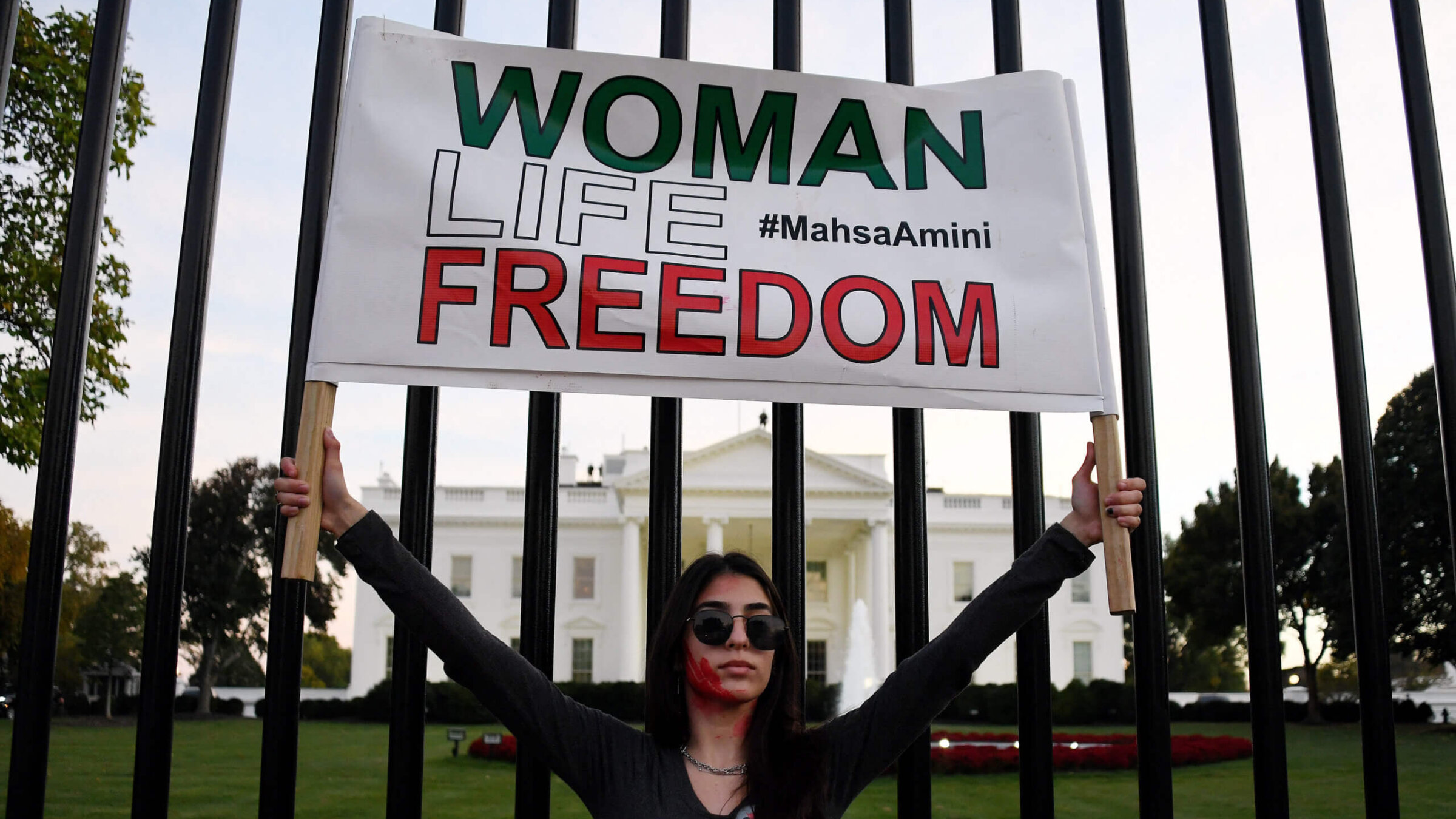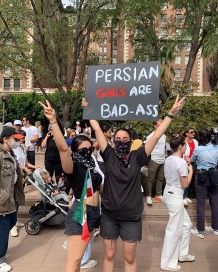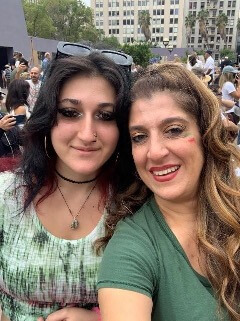For years, I struggled to reconcile my Iranian Jewish identity. The women’s protests have made me whole
Rosh Hashanah marks one year since the death of Mahsa Jina Amini at the hands of Iran’s morality police for ‘improperly’ wearing her hijab

A woman holds a placard as protesters march in solidarity with protesters in Iran in front of the White House in Washington, DC, on October 22, 2022. Photo by Olivier Douliery/AFP via Getty Images
Tears gushed so hard I could smell the salt in them. They blurred my eye makeup as I struggled to articulate and then belt out the words “Zan, Zendegi, Azadi!”
This was the first Woman, Life, Freedom (Zan, Zendegi, Azadi) march that I attended in Los Angeles, shortly after my 50th birthday. My Sept. 16 birthday often lands on Rosh Hashanah, and this year, it also coincides with the one-year anniversary of Mahsa Jina Amini’s death. A courageous Kurdish-Iranian woman, Amini was detained by the Iranian morality police in Tehran for allegedly not wearing her hijab properly. Three days later, her death on Sept. 16, 2022, sparked the international Woman, Life, Freedom movement. At least 537 people have been killed in Iran since demonstrations began, and 22,000 people have been arrested.
Pre-revolutionary flags waved, adorned with the Persian lion, a symbol of divine kingship framed by the sun. Curses like “Magbar dictator” (“Death to the dictator”) rang out against the regime and made me laugh out loud. I hugged my daughter tightly and pointed out a group of protesters her age holding a “Persian Girls are Bad-Ass” sign.

The Woman, Life, Freedom protests flip the script of the 1979 Islamic Revolution, wherein an oppressive theocratic regime led by Ayatollah Khomeini ousted Iran’s monarchy under Shah Mohammad Reza Pahlavi. Hailed as the first counter-revolution led by women and girls, the contemporary marches are a panacea of redemption at which my 7-year-old self, ostracized for her Iranian Jewish identity, finds refuge and healing.
The convergence of these Jewish and watershed events inspire in me a birthday request: that we uplift Iranian Jewish voices this Rosh Hashanah to express solidarity with the Iranian people in their fight for regime change, secular democracy, freedom of speech and equality for all.
In 1971, before the Revolution, my father and a circle (doreh) of his Iranian medical school buddies moved to the Detroit suburbs, drawn by emerging opportunities in the American medical field. My parents adjusted to newly married nuclear family life. My dad’s first American car was a forest green Ford Mustang, which he drove to work at the hospital. In the fall, my mother carved pumpkins with me and my sister and roasted the seeds in the special way she learned from her mom. She took us back-to-school shopping for the latest in ’70s fashion (corduroy pants).
Eventually, the undercurrent of instability in Iran seeped into our new American routine. The nightly news projected “Death to America!” (Magbar Amrika!) chants, posters of a fanatically bearded Khomeini, politicians vilifying Iranians and American flags aflame. My father’s eyes conveyed concern as phone calls from back home described the uprising unfolding from rooftops. My mother’s hands, holding the letter her sister wrote, trembled as she translated into English the details of how my aunt and grandfather escaped Iran through the desert into Turkey.
Such moments contrasted the joy of celebrating my parents’ U.S. naturalization in 1981 and taught me about the fragility of democracy. I understood early on that the pursuit of righteousness was evergreen, and can never be taken for granted.
As violence, religious persecution and economic hardship ensued after Khomeini took power, my mother’s family and 100,000 of Iran’s Jews were displaced from their home of 3,000 years, along with millions of other Iranians. The loss is devastating, and not contained to those who fled. The trauma floods the next generation, diluted just enough for us to survive, but not forget.
Then, in November 1979, militants in Iran seized 62 Americans at the U.S. embassy in Tehran and held 52 hostages. White birch tree trunks tautly bound with yellow ribbons on neighbors’ lawns multiplied, a sign of solidarity with the hostages. To us, they were a signal of hostility and racism against Iranian-Americans and we knew to steer clear. The 444 days of the Iran hostage crisis were a time to minimize my Iranian-ness, and a sense of resentment persisted for years afterward.

My father insisted that if asked, we were “Italian.” Years after the crisis, when I was called a liar and berated by classmates and acquaintances for explaining I was Jewish and Iranian (inconceivable to most given the media’s binary portrayal of Iran), I didn’t have the tools to process the frustration caused by these microaggressions, embrace my intersectional identity or find my voice.
Despite the slurs and bigotry around me growing up, my Jewish values and community have rooted me and guided my career now leading bridge building between diverse communities at The Jewish Federation of Greater Los Angeles. Yet, for the estimated 8,000 Jews who now remain in Iran, avoiding protest, refraining from criticism of the government, and minimizing their Jewishness is paramount to preventing backlash. It’s a concept familiar to Jews and other minorities throughout history.
On this Sept. 16, as global protests for a free Iran on Mahsa Amini’s yahrzeit coincide with the first day of Rosh Hashanah, I cherish the opportunity to proudly own my Jewishness and emancipate my Iranian-ness. It’s a moment of profound significance as I reconcile and make whole the facets of my identity as an Iranian Jewish American woman, daughter, and mother.
As many will be observing the holiday on Sept. 16 and unable to protest with our feet, we must embolden Iranian Jewish voices in our synagogues, organizations and at homes during the High Holidays and beyond. By elevating underrepresented experiences in this way, we pay homage to Mahsa’s and Iranian women’s right to freedom of expression, show allyship, deepen our understanding and human connections, and gain a needed new perspective as we embark on a hopefully sweeter, and more liberated, 5784.
To contact the author, email [email protected].



















